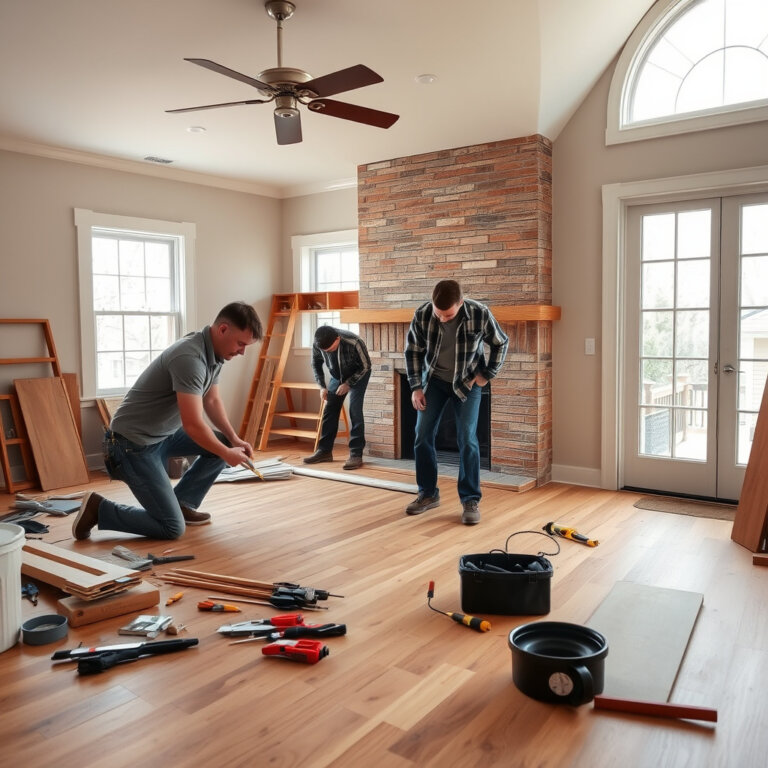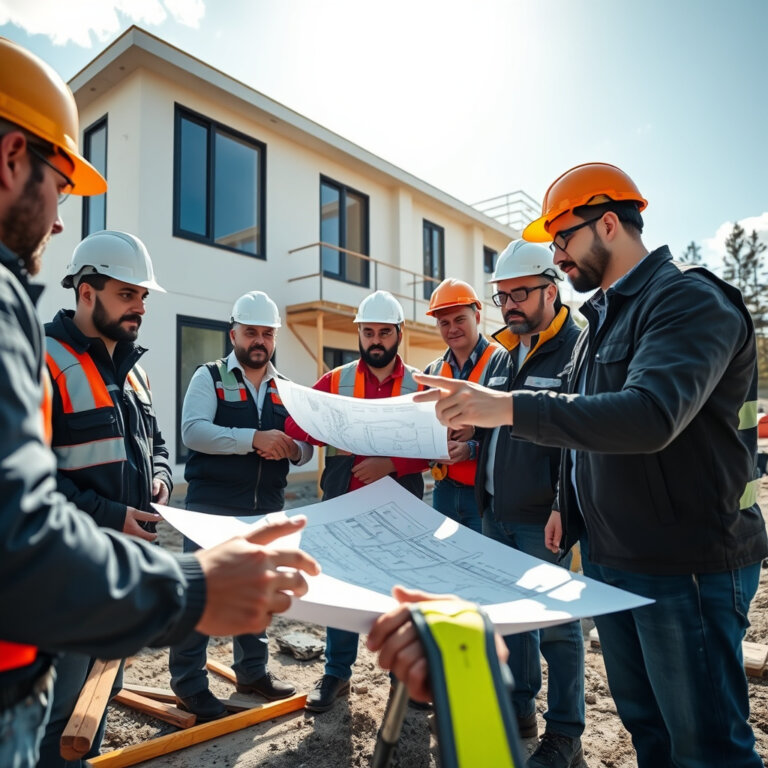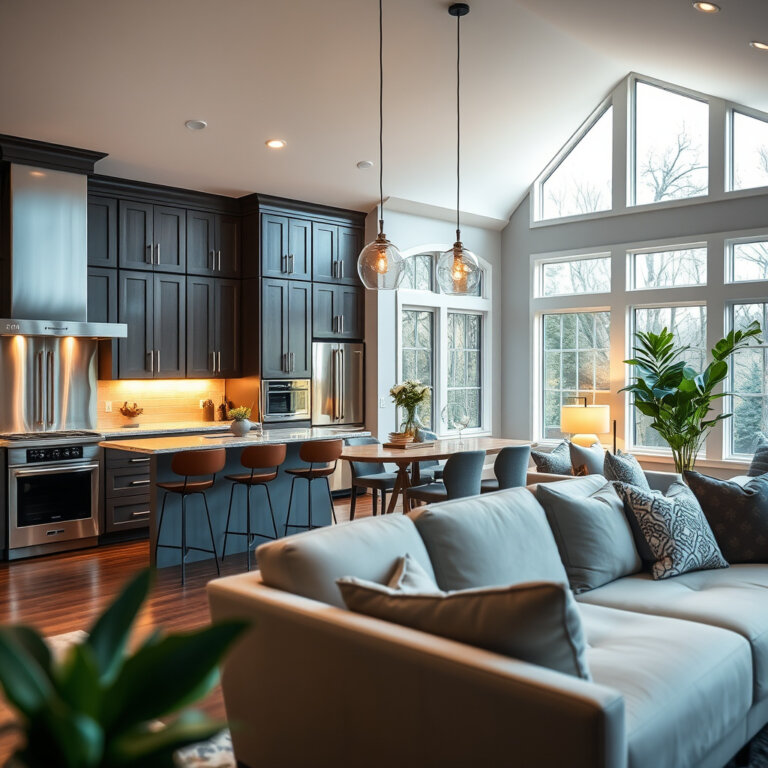Home addition project management Massachusetts involves overseeing the planning, execution, and completion of home expansion projects in the state.
Are you considering a home addition project management Massachusetts? This guide will walk you through everything you need to know, from permits to budgeting.
You’ll learn how to effectively manage your project to ensure it runs smoothly and stays within budget.
By the end, you’ll be equipped with the essential tips and insights that can make your home addition not just a dream, but a reality.
The Essential Guide to Planning Your Home Addition
Planning a home addition can be both exciting and overwhelming. It’s an opportunity to enhance your living space and increase the value of your property. However, careful planning is essential to ensure a smooth process. From understanding the necessary permits to selecting the right professionals, there are several steps to consider.
Understanding Your Needs
Before diving into the logistics, take some time to assess your needs. What is the purpose of your addition? Are you looking to expand your kitchen, add a bathroom, or create a home office? Defining your goals will help you stay focused throughout the planning process. Consider how this addition will impact your daily life and make a list of must-haves versus nice-to-haves.
Researching Local Building Codes
Every community has its own set of regulations regarding home additions. Familiarizing yourself with the Massachusetts building codes for home additions will save you time and headaches down the road. You’ll likely need to obtain a home addition permit in Boston MA, which requires submitting plans that comply with local regulations. Understanding these guidelines early on will help you navigate the permitting process efficiently.
Budgeting for Your Project
Establishing a realistic budget is crucial. Factors such as materials, labor, and permits can affect the overall cost. Research the cost of kitchen remodel in Worcester MA or the average cost of bathroom remodel in MA to gauge your budget. Don’t forget to set aside extra funds for unexpected expenses that may arise during construction. Consulting with a licensed contractor Massachusetts can provide valuable insights into accurate budgeting.
Selecting the Right Professionals
Choosing the right team to manage your home addition can make all the difference. Look for general contractor Massachusetts who have experience with similar projects. Request quotes from multiple professionals and check their references. Ask about their familiarity with the home improvement permit process in Boston to ensure they understand the local regulations. This will help you avoid any potential delays due to permitting issues.
Planning for Disruptions
A home addition project will inevitably cause some disruptions to your daily routine. Be prepared for noise, dust, and limited access to certain areas of your home. Communicate with your contractor about the timeline and keep an eye on the progress. Having a clear understanding of what to expect can help you manage any inconveniences.
Staying Informed Throughout the Process
Regular communication with your contractor is key to ensuring that your vision is realized. Schedule regular check-ins to discuss progress and address any concerns. If you’re curious about construction costs in Massachusetts, don’t hesitate to ask for updates on budget and resource allocation. Being involved in the process will help you make informed decisions and adjustments as needed.
Consider the Long-Term Benefits
While planning your home addition, it’s essential to think about its long-term benefits. A well-executed addition not only enhances your living space but can also serve as a smart real estate investment opportunity in MA. Whether you plan to stay in your home for years to come or are considering selling, a thoughtfully designed addition can significantly increase your property value.
By following these guidelines, you can confidently embark on your home addition journey. With careful planning and the right team in place, your vision can become a reality, enhancing both your home and your lifestyle.
Navigating the Permit Process for Home Additions
When embarking on a home addition project, understanding the permit process is crucial. This journey can feel overwhelming, but with the right guidance, it can be navigated smoothly. The first step involves familiarizing yourself with the local regulations specific to home addition permit Boston MA. Every municipality has its own set of rules, and knowing these can save you time and potential headaches down the line.
Understanding Local Regulations
Before you even begin your project, it’s essential to research the Massachusetts building codes for home additions. These codes not only ensure safety but also help maintain the aesthetic harmony of neighborhoods. Check with your local building department to gather information on zoning laws, which can dictate where and how you can expand your home.
Preparing Your Application
Once you have a grasp of the regulations, the next step is preparing your application. This typically includes submitting detailed plans of your proposed addition, which should accurately reflect the size, style, and intended use of the new space. You may want to work with a licensed contractor Massachusetts to ensure that your plans meet all necessary guidelines.
- Architectural drawings
- Site plans showing property lines
- Structural specifications
Additionally, depending on the scope of your project, you might need to provide evidence of how the addition will affect your property’s drainage and landscaping. A comprehensive application will help expedite the review process.
Submitting Your Permit Application
After assembling your application materials, it’s time to submit them to the appropriate local authority. This may involve visiting your local building department or submitting documents online, depending on your municipality. After submission, the review process begins. During this time, the department will evaluate your plans for compliance with all relevant codes and regulations.
Addressing Feedback and Adjustments
Once your application is under review, you may receive feedback or requests for modifications. It’s important to address these promptly, as delays can prolong the entire project timeline. Working with experienced home renovation contractors near me can be beneficial, as they often have insights into common issues that arise during the permit process.
Final Approval and Construction
After all necessary adjustments have been made and your application is approved, you will receive your building permit. This is a significant milestone in your home addition journey. However, it’s important to remain informed about inspection requirements throughout the construction process. Regular inspections ensure that the work meets safety and quality standards, which is crucial for the integrity of your home.
Understanding the ins and outs of the home improvement permit process Boston can significantly enhance your home addition experience. Whether you’re considering a small bump-out or a large extension, being proactive about permits will help you create your dream space without unnecessary delays or complications.
Choosing the Right Contractor for Your Home Addition
When embarking on a home addition, selecting the right contractor is a crucial step that can significantly influence the success of your project. This choice sets the tone for the entire process, from planning to execution. With so many options available, it’s essential to navigate this decision carefully, ensuring you find a contractor who aligns with your vision and needs.
Understanding Your Needs
Before diving into the search for a contractor, take some time to clarify your goals for the home addition. Are you looking to expand your living space, create a new office, or perhaps add a guest suite? Understanding the specifics of what you want will help you communicate effectively with potential contractors. Create a list of must-haves and nice-to-haves, which can serve as a foundation for discussions.
Researching Potential Contractors
Start your search by looking for licensed contractor Massachusetts professionals who specialize in home additions. You can begin with online searches or ask for recommendations from friends and family. It’s also helpful to check local directories and review platforms to find home renovation contractors near me.
Once you have a shortlist, delve deeper into each contractor’s background. Look for their experience with similar projects and check their portfolio. A reputable contractor should be able to showcase completed projects that align with your style and preferences.
Checking Credentials and Reviews
When you narrow down your options, ensure that the contractors are licensed and insured. This is crucial for protecting yourself from potential liabilities during the construction process. You can verify their credentials through state licensing boards. Additionally, reading customer reviews can provide insights into their work ethic and reliability. Ask for references and make a point to contact previous clients to gauge their satisfaction with the contractor’s work.
Interviewing Candidates
Set up interviews with your top choices to discuss your project in detail. Prepare to ask questions about their approach to home addition project management Massachusetts, including timelines, communication methods, and handling unexpected challenges. Pay attention to how well they listen to your ideas and how they offer solutions. A good contractor should not only be knowledgeable but also be someone you feel comfortable collaborating with.
Getting Detailed Estimates
Once you feel confident in your candidates, request detailed estimates from each. This should outline labor costs, materials, and a timeline for completion. Be wary of estimates that seem significantly lower than others, as they may indicate potential issues down the line. Understanding the construction costs in Massachusetts can help you gauge whether the estimates are reasonable.
Understanding the Permit Process
Before finalizing your choice, ensure that the contractor is familiar with the home improvement permit process Boston. They should be equipped to handle the necessary paperwork, including applying for a home addition permit Boston MA. This knowledge can save you time and hassle, ensuring that your project complies with Massachusetts building codes for home additions.
Ultimately, choosing the right contractor is about finding someone who resonates with your vision, communicates transparently, and demonstrates a commitment to quality. As you embark on this journey, keep in mind that the right partnership can make all the difference in creating the space you’ve always dreamed of.
Budgeting for a Home Addition: What You Need to Know
When considering a home addition, crafting a realistic budget is essential. This process can feel overwhelming, but breaking it down into manageable steps can simplify the task. First, it’s important to understand that costs can vary significantly based on the type of addition you’re planning. Whether you’re envisioning a new bedroom, a sunroom, or expanding your kitchen, each project comes with its own set of expenses.
Understanding the Costs
Before diving into numbers, you should familiarize yourself with the construction costs in Massachusetts. The costs can include materials, labor, permits, and unexpected expenses that often arise during any construction project. To get a clearer picture, consider the following key components:
- Materials: The quality and type of materials you choose will greatly influence your budget. From framing to finishes, every decision impacts the bottom line.
- Labor: Hiring a reputable licensed contractor Massachusetts will ensure quality work. It’s wise to compare quotes from different home renovation contractors near me to find a fair price.
- Permits: Don’t forget to budget for the home addition permit Boston MA. Understanding the home improvement permit process Boston can save you time and money later on.
- Contingency Fund: It’s smart to set aside about 10-20% of your overall budget for unexpected costs. This buffer can help you navigate any surprises that arise during construction.
Planning for the Permit Process
Navigating the permit process can be daunting, but it’s a crucial part of budgeting for your addition. Understanding how to apply for a building permit is key to keeping your project on track and compliant with Massachusetts building codes for home additions. Take the time to research the specific requirements in your area, as this can vary significantly.
Choosing the Right Contractor
Selecting a trusted contractor can greatly affect your project’s success. Look for contractors who specialize in home additions and have a proven track record. Checking credentials is essential; always work with a general contractor Massachusetts who is licensed and insured. Reading reviews and asking for references can also help you find the best professionals for your project.
Additional Considerations
As you finalize your budget, it’s worthwhile to consider the long-term value of your home addition. A well-planned addition can enhance your property’s appeal and potentially increase its value, making it a solid real estate investment opportunity in MA. Additionally, if you’re considering a kitchen remodel or bathroom remodel, keep in mind the average cost of bathroom remodel in MA and the cost of kitchen remodel in Worcester MA to ensure your budget aligns with your overall vision.
Ultimately, effective budgeting for your home addition is about balancing your dreams with practical financial planning. By breaking down the costs, preparing for permits, and selecting the right professionals, you can create a space that not only meets your needs but also adds value to your home for years to come.
Design Trends for Home Additions in Massachusetts
As homeowners in Massachusetts consider expanding their living spaces, they are increasingly embracing design trends that enhance both functionality and aesthetics. The current focus is on creating harmonious additions that seamlessly blend with the existing structure while offering modern conveniences and comfort. From open concept designs to sustainable materials, the choices available today reflect a desire for more than just extra square footage.
Open Concept Living Spaces
One of the most sought-after trends is the open concept layout. Homeowners are looking to eliminate barriers between rooms, creating a fluid space that promotes interaction and connectivity. This is particularly popular for kitchen and living room combinations, allowing families to engage while cooking, entertaining, or simply relaxing. When planning this type of addition, it’s essential to consult with a licensed contractor Massachusetts to ensure structural integrity and adherence to local regulations.
Sustainable and Eco-Friendly Materials
With a growing awareness of environmental issues, many homeowners are opting for sustainable materials in their home addition projects. Utilizing reclaimed wood, energy-efficient windows, and eco-friendly insulation not only reduces the environmental impact but can also lead to significant savings on utility bills. If you’re considering such an addition, research local suppliers who specialize in these materials to maximize your investment and ensure compliance with Massachusetts building codes for home additions.
Smart Home Integration
Technology is playing a pivotal role in modern home redesigns. Integrating smart home features such as automated lighting, heating, and security systems into your addition can enhance convenience and efficiency. Homeowners are increasingly interested in how these technologies can be incorporated into their spaces without compromising design. Consulting with a general contractor Massachusetts who is well-versed in smart home technologies can help you navigate the best options for your needs.
Outdoor Living Spaces
Massachusetts homeowners are also focusing on outdoor living areas, recognizing the importance of extending their living spaces beyond the walls of their homes. Features such as decks, patios, and outdoor kitchens are becoming increasingly popular. These spaces not only provide areas for relaxation and entertainment but also increase the overall value of the property. When planning your outdoor addition, be sure to consider how it will integrate with your landscape and existing home design.
Maximizing Natural Light
Incorporating larger windows, skylights, and open spaces can significantly enhance the natural light in your home. This trend is particularly effective in areas like sunrooms or extensions that connect to the outdoors. Maximizing natural light not only improves the ambiance of the space but can also positively impact your mood and well-being. When designing your addition, think about how the placement of windows can create a bright, inviting atmosphere.
Choosing the Right Color Palette
Color plays a crucial role in setting the tone for any space. Currently, many homeowners are gravitating towards neutral palettes accented with bold colors. This approach allows for flexibility in decorating while maintaining a cohesive look. A well-thought-out color scheme can also help your addition feel like a natural extension of your home. When working with a home renovation contractor near me, discuss your color preferences and how they can be incorporated into your design.
Budgeting and Planning
As with any home addition, budgeting is a critical consideration. Understanding the construction costs in Massachusetts and having a clear plan can help you avoid unexpected expenses. Be sure to include costs for permits, materials, and labor in your budget. Engaging a licensed contractor Massachusetts early in the process can provide valuable insights into realistic costs and help you stay on track financially throughout your project.
By embracing these design trends, homeowners in Massachusetts can create beautiful, functional spaces that enhance their lifestyle while adding value to their property. Whether it’s an open concept layout, sustainable materials, or smart home technology, the right addition can transform a house into a dream home.
Managing Your Home Addition Project Timeline Effectively
When embarking on a home addition project, managing the timeline effectively is crucial to ensure a smooth process and a successful outcome. With multiple facets to consider, from design to execution, having a clear timeline can help you stay organized and minimize stress. Here’s how to approach this task.
Establish a Clear Vision
Before you dive into the nitty-gritty of scheduling, it’s essential to have a clear vision of what you want to achieve with your home addition. Think about the purpose of the addition. Is it a new bedroom, a larger kitchen, or perhaps a sunroom? Having a clear vision will guide every step of the project, from the initial design to the final touches.
Set Realistic Milestones
Once you have a vision, break it down into manageable milestones. This includes:
- Initial design and approvals
- Obtaining necessary permits, such as a home addition permit Boston MA
- Hiring a licensed contractor Massachusetts
- Begin construction
- Final inspections and adjustments
By setting these milestones, you can track your progress effectively. Each milestone should have a specific timeline that accounts for potential delays, such as weather conditions or the availability of materials.
Communicate with Your Contractor
Having open lines of communication with your general contractor Massachusetts is vital. Regular check-ins ensure that everyone is on the same page regarding timelines and expectations. Discuss potential hurdles and how they might impact your schedule. Your contractor can provide insights into typical construction timelines and help you adjust your expectations accordingly.
Be Prepared for Delays
In construction, delays can be common. Whether it’s waiting for a permit or facing unexpected weather conditions, being flexible in your timeline can save you from frustration. For instance, understanding the home improvement permit process Boston can help you anticipate any delays in getting the green light to start your project.
Monitor Progress Regularly
Take the time to regularly monitor the progress of your home addition. This doesn’t mean you need to be on-site every day, but scheduling weekly check-ins can help you stay informed about the status of the project. If you notice any discrepancies between the planned timeline and what’s happening on the ground, address them immediately with your contractor.
Adjust as Necessary
Sometimes, despite your best efforts, things don’t go as planned. Be prepared to adjust your timeline as necessary. This might mean pushing back certain milestones or finding ways to expedite processes, such as seeking out home renovation contractors near me who can step in if your original contractor faces delays.
Celebrate Small Wins
As you reach each milestone, take a moment to celebrate your progress. Whether it’s completing the foundation or finishing the roofing, acknowledging these achievements can keep your spirits high and motivate everyone involved.
Stay Informed on Local Regulations
Understanding local regulations, such as Massachusetts building codes for home additions, is integral to avoiding delays. Staying informed will enable you to anticipate the necessary permits and inspections, ensuring your project remains on track.
By managing your home addition project timeline effectively, you can create a space that not only meets your needs but also enhances the value of your home. The journey may be complex, but with careful planning and communication, you can bring your vision to life without unnecessary hiccups.
Understanding the Impact of Local Regulations on Your Project
When embarking on a home addition project management in Massachusetts, it’s crucial to grasp how local regulations can shape every aspect of your endeavor. These regulations are not just formalities; they serve as the framework that governs safety, design, and overall feasibility. Understanding them can save you time, money, and potential headaches down the road.
The Role of Building Codes
Building codes in Massachusetts are designed to ensure that all structures are safe and reliable. Each city or town may have specific requirements, so it’s vital to familiarize yourself with the local codes applicable to your project. For instance, if you’re considering a home addition in Boston, you’ll need to navigate the home improvement permit process Boston offers. This process is essential in ensuring your project complies with local standards.
- Research the Massachusetts building codes for home additions.
- Consult with a licensed contractor Massachusetts to ensure compliance.
- Be proactive about understanding zoning laws that may apply to your area.
Permitting Process
The permitting process can seem daunting, but it is a vital step in your project. Knowing how to apply for a building permit can streamline your experience. In Massachusetts, this often involves submitting detailed plans and specifications to your local building department. Depending on your project’s scope, you might need various permits, such as roofing permits in Newton MA, or other specific construction services Massachusetts may require.
Impact on Project Timeline
Local regulations can significantly affect your project timeline. Delays in obtaining permits or making adjustments to meet code requirements can push back your completion date. Engaging with a general contractor Massachusetts familiar with local regulations can help mitigate these delays. They can guide you through the intricacies of the permitting process, ensuring all documentation is in order and submitted on time.
Cost Considerations
Understanding local regulations also impacts your budget. Knowing the construction costs in Massachusetts and factoring in potential permit fees is crucial for accurate budgeting. For example, if you’re considering the cost of kitchen remodel in Worcester MA, you may find that certain design choices are subject to additional scrutiny under local codes, affecting your overall expense.
Finding the Right Professionals
Partnering with the right professionals is essential for navigating these local regulations effectively. Searching for home renovation contractors near me can lead you to experienced teams who understand the specifics of Massachusetts regulations and can offer tailored advice. A licensed contractor can help ensure that your project adheres to all necessary codes and permits, providing you with peace of mind as you move forward.
In the current landscape of home improvement, a thorough understanding of local regulations not only protects your investment but also enhances the overall quality and longevity of your home addition. Being informed empowers you to make better decisions, paving the way for a successful project that meets your vision while adhering to necessary standards.
Post-Completion: Ensuring Your Home Addition Meets Expectations
Após a conclusão do seu projeto de adição residencial, é essencial garantir que tudo esteja conforme suas expectativas. Essa etapa final pode ser tão importante quanto o planejamento inicial e a execução. Um acompanhamento cuidadoso pode fazer toda a diferença na satisfação geral com o resultado.
Inspeções Finais e Verificações
Um dos primeiros passos após a conclusão é realizar uma inspeção detalhada da nova área. Verifique se todos os aspectos da construção estão de acordo com os planos originais e se a qualidade está à altura das suas expectativas. Isso inclui:
- Verificar a integridade estrutural, como paredes, tetos e fundações.
- Testar sistemas elétricos e hidráulicos para garantir que tudo funcione corretamente.
- Avaliar acabamentos, como pintura, pisos e instalação de janelas.
Se você identificar algum problema, é importante entrar em contato com seu licensed contractor Massachusetts imediatamente para resolver qualquer pendência.
Documentação e Permissões
Após a conclusão, você deve assegurar que toda a documentação necessária esteja em ordem. Isso inclui permissões que podem ser exigidas, como o home addition permit Boston MA. Tenha certeza de que todos os registros, incluindo inspeções finais, estão arquivados corretamente. Essa documentação não só protege você legalmente, mas também pode ser essencial se você decidir vender sua casa no futuro.
Feedback e Avaliação do Contratante
É vital também avaliar o desempenho do seu general contractor Massachusetts. Compartilhar suas experiências pode ajudar outros proprietários a encontrar os melhores home renovation contractors near me. Considere deixar uma avaliação online ou fazer recomendações pessoais. Essa prática não só ajuda a comunidade, mas também fornece um feedback valioso para o seu contratante.
Adaptação e Personalização do Espaço
Depois de garantir que tudo esteja em conformidade, é hora de personalizar sua nova adição. Pense em como você pode aprimorar o espaço para torná-lo mais funcional e acolhedor. Use o seu estilo pessoal na decoração e nos acabamentos. Isso não só tornará o espaço mais agradável, mas também refletirá quem você é como proprietário.
Além disso, considere como a nova adição se encaixa no valor geral da sua propriedade. No cenário atual, uma adição bem planejada pode oferecer ótimas oportunidades de investimento imobiliário em MA, especialmente se você considerar as construction services Massachusetts disponíveis para futuras melhorias.
Manutenção e Cuidados Contínuos
Por último, não se esqueça da manutenção. Verifique regularmente o estado do seu novo espaço. Isso pode incluir inspeções de telhados, especialmente se você trabalhou com um licensed roofing contractor Newton MA. Manter sua casa em boas condições não só preserva seu investimento, mas também garante que você aproveite ao máximo sua nova adição.
Mantenha-se informado sobre os Massachusetts building codes for home additions para garantir que qualquer atualização futura esteja em conformidade, evitando assim complicações com o home improvement permit process Boston. Ao seguir essas etapas, você pode garantir que sua nova adição não só atenda, mas supere suas expectativas.

At Builders RD, our editorial team is made up of construction professionals, researchers, and local content strategists who specialize in home improvement, permitting, and contractor services across Massachusetts. We work closely with industry experts, licensed contractors, and municipal guidelines to deliver accurate, actionable content that helps homeowners, investors, and builders make confident decisions.
Our mission is to simplify the construction process through trustworthy guidance — from permit applications to hiring the right team — so you can build smarter, safer, and with full peace of mind.
— Builders RD Editorial Team






